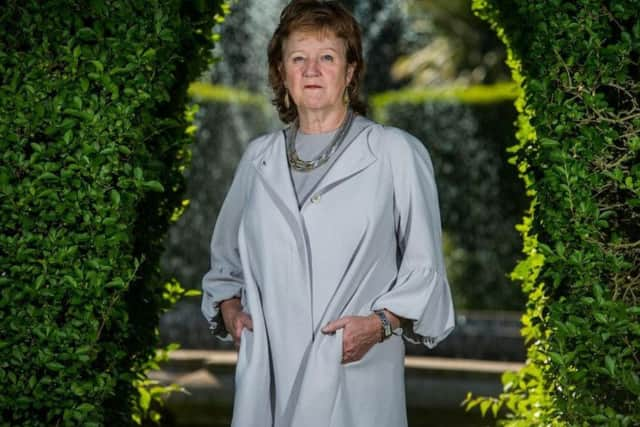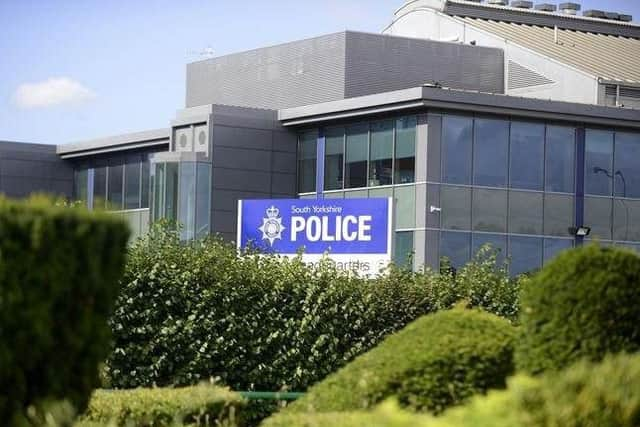Ignore PM '˜swarm' remark on migrants, South Yorkshire police trainees told


A document obtained by The Yorkshire Post sets out how recent recruits to South Yorkshire Police are trained to tackle the biggest issues facing the force.
Members of an independent ethics panel, set up in 2015 in the aftermath of the Rotherham abuse scandal, spent 30 hours observing a cohort of new officers in late 2016.
Advertisement
Hide AdAdvertisement
Hide AdTopics covered include how to deal with rape, child sexual exploitation (CSE), human trafficking, terror offences and domestic abuse.


Included in the report, obtained under the Freedom of Information Act, describes training on modern slavery and human trafficking where trainees are shown a short video by singer Robbie Williams and “an image of a boat, packed with men, women and children, adrift in the Mediterranean”.
According to the report: “Pointing to the children, [a trainer] reminded the trainees that there can be no collective judgements about these people, that they must each be recognised as an individual, that they are not, quoting the words of a recent former Prime Minister, a ‘swarm’ and that police officers, if they encounter trafficking or slavery, have to find out the story of each individual referred to the UK’s obligations under the UN’s Palermo Protocol to combat all forms of slavery and to provide for the needs of victims.
“Officers needed to be very wary of how vulnerable people are represented in the press and media.”
Advertisement
Hide AdAdvertisement
Hide AdDavid Cameron was criticised for his use of words at the height of the 2015 crisis as more than a million migrants and refugees from Syria, Iraq and Afghanistan crossed into Europe.


Asked about the Calais crisis, the Prime Minister spoke of “a swarm of people coming across the Mediterranean, seeking a better life, wanting to come to Britain”.
The two members of the independent ethics panel, who also interviewed another cohort of 16 new officers as part of their work, were reporting back on whether ethical standards, as set out in the 2014 police Code of Ethics, are reflected in training.
They wrote: “Whilst the language of the Code of Ethics is rarely invoked formally, there is constant and heavy emphasis on what it means to be a Police Officer and the ethos of serving the public.”
Advertisement
Hide AdAdvertisement
Hide AdDuring an “intensive and demanding” session in the Hydra immersive learning suite, a training simulator designed to develop their decision-making abilities, recruits were asked to investigate a report of a sexual assault on a young woman working in a pub.


The report said: “Trainers stressed the primacy of victim care and emphasised that this is an area of past failings for the police.
“At the same time it was made clear that this had to be balanced against the importance of taking steps necessary to build a case against a potential offender, in particular during the ‘golden hour’, the short period of time after an offence has been committed, when some of the best evidence may be available.
“The trainees are put under real time pressure to resolve the dilemma.”
Advertisement
Hide AdAdvertisement
Hide AdThe authors said they were told by one of the trainers that “a generation or so ago”, the “relatively minor but very unpleasant brief sexual assault” may not have been considered a crime.


They wrote: “It might have fallen into the category of ‘the boss in a pub being a bit fresh with one of his bar-maids’.
“Today’s officers are being trained to a very high level of awareness of their obligation to protect the public and the changed expectations they have to meet in the contemporary world. An all-pervasive ethical dimension appears to inform this training.”
In a session on counter-terrorism, trainees were told they “could not afford to be complacent or imagine that [South Yorkshire] is not a potential terrorist target”.
Advertisement
Hide AdAdvertisement
Hide AdThe report said: “There appears to be an expectation that in the existing climate the average member of the public, described as a ‘reasonable person’, will have no objection to being stopped and questioned if there is a risk of an terrorist act.
“This seems somewhat optimistic and there may be scope to explore what the ‘reasonable person’ is.
“The trainers set great store by the personal style of the officer, particularly in dealing with potentially very difficult circumstances where the nature of the police style or approach has the capacity to aggravate or de-escalate a situation very quickly.”


And in a section of the training about dealing with rape, the report said: “The overall message to trainees was clear: understand, believe but never make judgements about the victim/survivor.”
Advertisement
Hide AdAdvertisement
Hide AdThere was also a section on child sexual exploitation, a thorny issue for the force due to its failure over 16 years to stop the widespread abuse of children in Rotherham by grooming gangs.
A three-hour “uninterrupted and intensive session” by two experienced officers drew on the findings of the bombshell 2014 Jay Report into the scandal.
According to the report’s authors, trainees were left in no doubt that officers “must not turn their back on victims” and that “it is wrong to approach CSE with fixed expectations of what a victim looks and sounds like”.
It added: “CSE is about exploitation not love – the use of apparent affection is a useful tool in exploiting vulnerable children and young people.
Advertisement
Hide AdAdvertisement
Hide Ad“It is wrong to expect co-operation and gratitude from victims – this is not always forthcoming. There are many reasons why a victim may not initially disclose vital information to police.
“Where necessary, officers have to be confident enough to intervene to prevent the possibility of significant harm – they should ‘back their judgement’.
“The main thrust of the session was to ensure that trainees understand that CSE is a very complex phenomenon.
“The manner in which the issue is reported in the press and media greatly over-simplifies CSE and is often misleading. Trainees should read around the matter.”